Solar panels have become increasingly popular in recent years, and for a good reason as they offer a clean and renewable source of energy. Have you ever thought about how much money you have spent till now just for electricity?
Think smartly, installing solar panels at your home can ease your money on electricity bills. In this article, we’ll explore the benefits of installing solar panels at home and what you need to consider before making the switch.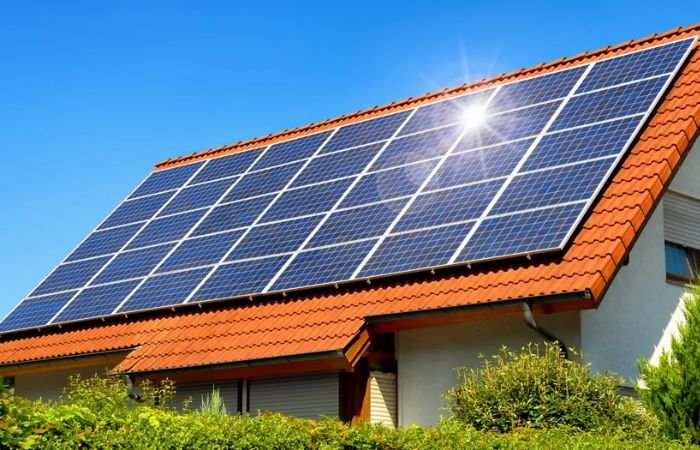
What are Solar Panels and its benefits?
Solar panels are made up of photovoltaic cells that convert sunlight into electricity. The more sunlight that hits the panels, the more electricity they can produce. This energy can then be used to power your home, or even sold back to the grid if you generate more than you need.
One of the biggest advantages is cost savings. By generating your own electricity, you can significantly lower your electricity bills. In fact, depending upon your location and size of the system, you may even be able to eliminate your electricity bills altogether.
Another benefit may include environmental impact, by using a renewable source of energy you can significantly reduce your carbon footprint and contribute to a cleaner environment.
Explore- Vastu Shastra tips for construction
Types of Solar Panel
There are three main types of solar panels: monocrystalline, polycrystalline, and thin-film. Each type of solar panel has its own benefits and drawbacks, and the best option for you will depend on a variety of factors, including your budget, energy needs, and available space.
Monocrystalline Solar Panel
Monocrystalline solar panels are a type of photovoltaic (PV) panel that is made from a single crystal of silicon. They are highly efficient and are often considered the most advanced and reliable solar panels on the market.
ADVANTAGES:
- High efficiency
- Durability and longevity
- Less maintenance
- High quality
- Reliable choice for homeowners
DISADVANTAGES:
- Higher cost
- Expensive to manufacture
- Less accessible for tight budget owners
Guide: to reduce Construction cost in india
Polycrystalline Solar Panel
They are also known as multicrystalline solar panels; which are made from multiple silicon crystals. They are a popular choice for homeowners and businesses looking for an affordable and efficient way to generate electricity. 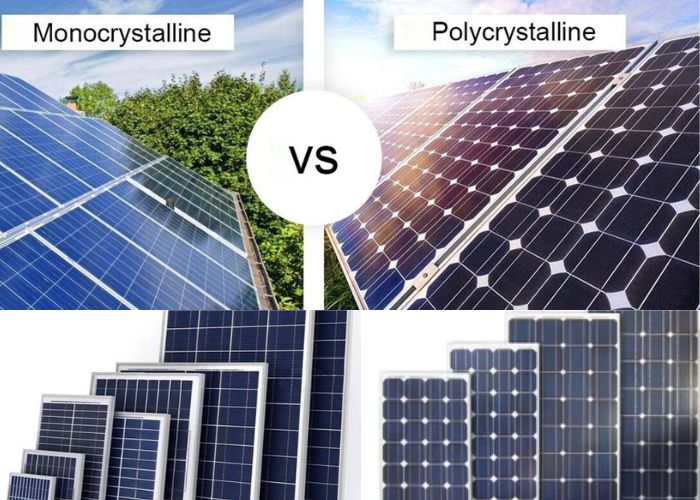
ADVANTAGES:
- Lower cost
- Less expensive to manufacture
- Less processing
- More accessible option for homeowners having tight budget
DISADVANTAGES:
- Lower efficiency
- Less durable
- Shorter lifespan
- Need more maintenance and replacement over time
- Require ample space for installation
Thin Film Solar Panels
These types of solar panels are made from a thin layer of semiconductor material such as cadmium telluride or copper indium gallium selenide. They are flexible and can be made in a variety of shapes and sizes.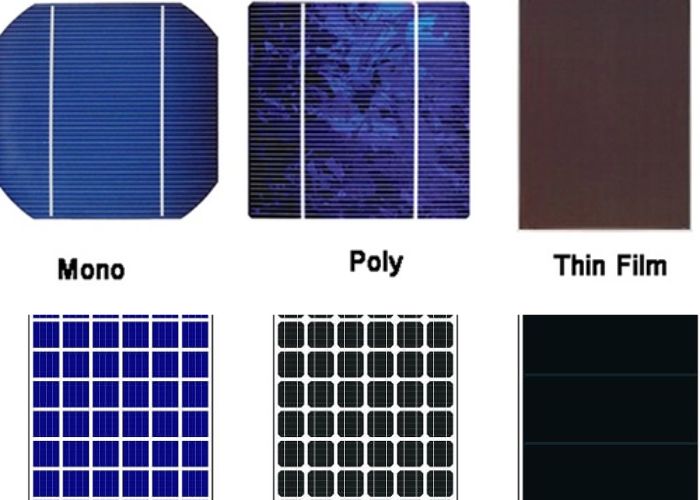
ADVANTAGES:
- Low cost
- Less material required as well as less processing
- More Flexible
- Good option for homeowner having tight budget
- Versatile in nature
DISADVANTAGES:
- Less efficient
- More space to generate electricity
- Shorter lifespan
- Can be replaced more frequently
Have a look at- Front wall architecture ideas
Installation of Solar Panel At Home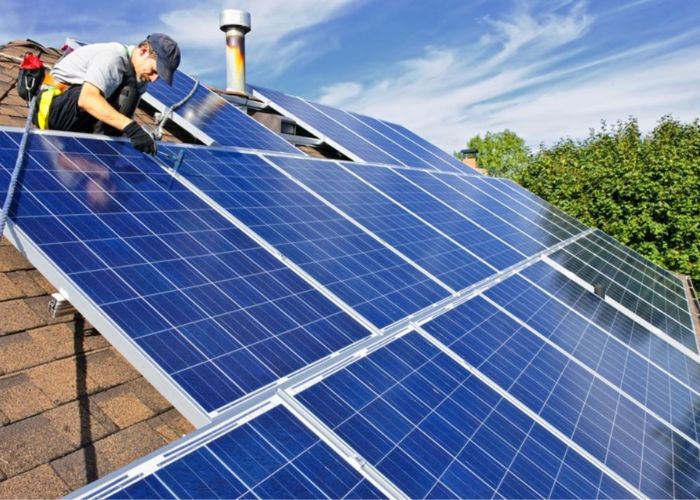
Here are the general steps involved in the installation of solar panel:
- Conduct a site assessment: A professional installer will come to your home to assess your roof on several factors such as roof, shading, size of electrical device and determine which location is safe for the installation.
- Design the system: The installer will design a solar panel system according to your home’s energy needs and characteristics of the roof
- Obtain permits: Before installation, you need to take permits from your local building department.
- Install the panels: The installation process will take around 3-4 days. The solar panels will be mounted to your roofs.
- Inspection and interconnection: Once the installation is complete, your solar panel needs to be inspected if it is working properly or not.
- Monitoring and Maintenance: It is important to monitor your solar panels regularly to ensure its functioning properly and generating expected amounts of electricity.
Price of Solar Panels
The price of solar panels in India can vary depending upon several factors such as type of solar panel, brand, size of the system, location and other installation charges.
Every 1KW system can cost around Rs.40,000 to 80,000, here is a price list of solar panels on KW basis.
| 1KW | Rs. 70,000 to Rs. 1,10,000 |
| 2KW | Rs. 1,40,000 to Rs. 1,80,000 |
| 3KW | Rs. 1,80,000 to Rs. 2,40,000 |
| 4KW | Rs. 2,40,000 to Rs. 3,20,000 |
| 5KW | Rs. 3,00,000 to Rs. 4,00,000 |
| 10KW | Rs. 6,00,000 to Rs. 8,00,000 |
Note: Generally, the price of solar panels in India has been decreasing over the past few years due to government incentives and increased competition in the market.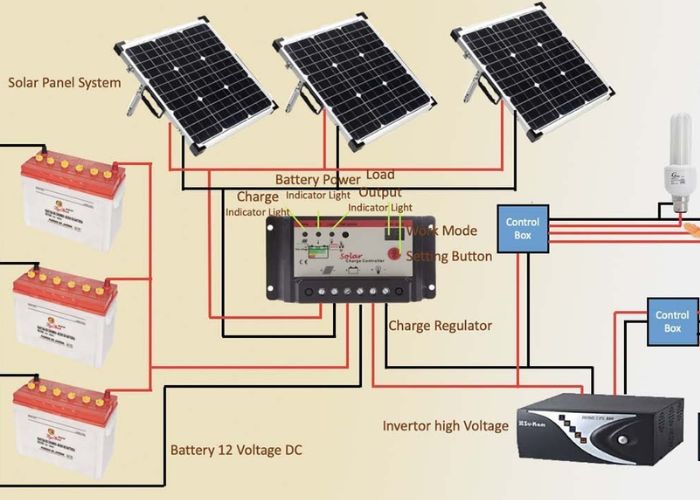
You can also avail government subsidy on a solar system for home:
For Homeowners:
- System capacity up to 3 kW: Receive a subsidy of ₹14,588 per kW
- System capacity above 3 kW and up to 10 kW: Receive a subsidy of ₹14,588
- System capacity above 10 kW: Receive a fixed subsidy of ₹94,822
For Housing Societies:
- Plant capacity up to 10 kW: Receive a fixed subsidy of ₹94,822
- Plant capacity above 10 kW: Receive a subsidy of ₹7,294 per kW
CONCLUSION
In conclusion, installing solar panels at home is a wise investment for several reasons. It not only saves you money on your electricity bills but also helps to reduce your carbon footprint and support a more sustainable future.
Solar panels are a clean, renewable source of energy, which means they do not produce harmful emissions or contribute to climate change. Additionally, they provide energy independence and security, as you are not reliant on the electricity grid and its fluctuations.
While the initial cost of installation may seem high, solar panels have a long lifespan of up to 25 years and can provide cost savings for the entire duration. Governments offer incentives for installing solar panels, such as tax credits or rebates, which can help offset the initial cost of installation.
With the help of professional installers, you can design and install a solar panel system that is tailored to your home’s energy needs and roof characteristics. So, if you are considering a renewable and sustainable source of energy, solar panels are a great option to explore.
Also read about- Place of puja room according to vastu


